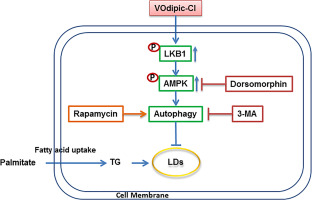Journal of Inorganic Biochemistry ( IF 3.8 ) Pub Date : 2018-03-14 , DOI: 10.1016/j.jinorgbio.2018.03.006 Ying Huang , Fang Liu , Fang Zhang , Pingsheng Liu , Tao Xu , Wenjun Ding

|
Numerous studies have demonstrated that vanadium compounds are able to improve lipemia and triglyceridemia in both humans and animals. However, the molecular mechanism remains elusive. The present study was conducted to investigate the anti-hyperlipidemic effect of vanadium(IV) complex with 4-chlorodipicolinic acid (VOdipic-Cl)-induced autophagy on hepatic lipid accumulation. To explore the possible underlying mechanisms, primary rat hepatocytes, human hepatoma cell line HepG2, and liver tissue from C57BL/6 mice fed a high-fat diet (HFD) were used. In vitro, cultured primary rat hepatocytes were treated with palmitate (0.25, 0.5 and 0.75 mM) prior to VOdipic-Cl (50, 100, and 200 μM) for 24 h, respectively. In vivo, C57BL/6 mice were fed with high-fat diet for 16 weeks. VOdipic-Cl (10 mg V/kg body weight) was given by daily gavage for 4 weeks. In vitro results showed that VOdipic-Cl significantly inhibited lipid droplet formation by increasing the level of conversion and punctuation of microtubule-associated proteins light chain 3 (LC3) in a dose-dependent manner, and activated liver kinase B-1 (LKB1) and adenosine monophosphate-activated protein kinase (AMPK) phosphorylation. Confocal microscopy images also showed that VOdipic-Cl induced sequestration of lipid droplets (LDs) by autophagy. In vivo, VOdipic-Cl attenuated the increase in serum and liver triglyceride levels in the mice fed with high-fat diet, while significantly increased autophagy induction and activated LKB1 and AMPK phosphorylation in the liver. Taken together, these results suggest that VOdipic-Cl reduces hepatic lipid accumulation by inducing autophagy via the activation of LKB1/AMPK-dependent signaling pathway.
中文翻译:

通过诱导自噬钒(IV)-chlorodipicolinate的缓解肝脏脂质蓄积经由所述LKB1 / AMPK信号传导途径在体外和体内
大量研究表明,钒化合物能够改善人和动物的血脂和甘油三酸酯血症。但是,分子机制仍然难以捉摸。本研究旨在研究钒(IV)与4-氯二吡啶甲酸(VOdipic-Cl)诱导的自噬对肝脏脂质蓄积的抗高血脂作用。为了探索可能的潜在机制,使用了高脂饮食(HFD)喂养的原代大鼠肝细胞,人肝癌细胞系HepG2和C57BL / 6小鼠的肝组织。在体外,将培养的大鼠原代肝细胞分别用棕榈酸酯(0.25、0.5和0.75 mM)处理,然后分别用VOdipic-Cl(50、100和200μM)处理24 h。体内对C57BL / 6小鼠进行高脂饮食喂养16周。通过每日管饲法给予VOdipic-Cl(10 mg V / kg体重),持续4周。体外结果显示,VOdipic-Cl通过以剂量依赖的方式增加微管相关蛋白轻链3(LC3)的转化和标点水平,并激活了肝激酶B-1(LKB1)和蛋白,从而显着抑制了脂质滴的形成。腺苷单磷酸激活的蛋白激酶(AMPK)磷酸化。共聚焦显微镜图像还显示,VOdipic-Cl通过自噬诱导脂质滴(LDs)的螯合。体内VOdipic-Cl可以减轻高脂饮食喂养的小鼠血清和肝脏甘油三酯水平的增加,同时显着增加自噬诱导并激活肝脏中的LKB1和AMPK磷酸化。综上所述,这些结果表明,VOdipic-Cl通过激活LKB1 / AMPK依赖性信号传导途径诱导自噬而减少了肝脂质蓄积。











































 京公网安备 11010802027423号
京公网安备 11010802027423号